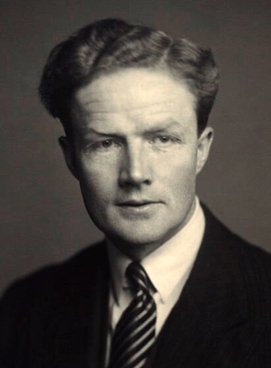Kenneth Younger facts for kids
Quick facts for kids
Sir Kenneth Younger
|
|
|---|---|

Portrait by Walter Stoneman, 1947
|
|
| Shadow Home Secretary | |
| In office 14 December 1955 – 13 May 1957 |
|
| Leader | Hugh Gaitskell |
| Preceded by | Position established |
| Succeeded by | Patrick Gordon-Walker |
| Member of Parliament for Grimsby |
|
| In office 5 July 1945 – 18 September 1959 |
|
| Preceded by | Sir Walter Womersley |
| Succeeded by | Anthony Crosland |
| Personal details | |
| Born |
Kenneth Gilmour Younger
15 December 1908 |
| Died | 19 May 1976 (aged 67) London, England |
| Political party | Labour |
| Spouse | Elizabeth Stewart |
| Children | 3, including Sam |
| Alma mater | New College, Oxford |
| Military service | |
| Allegiance | |
| Branch/service | |
| Unit | Intelligence Corps |
| Battles/wars | Second World War |
Sir Kenneth Gilmour Younger (born December 15, 1908 – died May 19, 1976) was a British politician. He was a member of the Labour Party and also a barrister, which is a type of lawyer. He worked in government roles under Prime Minister Clement Attlee. Later, he was a spokesperson for the opposition party. He eventually left Parliament early because he felt disappointed with party politics.
Contents
Family Background
Kenneth Younger came from a well-known family. His father was James Younger, 2nd Viscount Younger of Leckie. This background was quite unusual for someone in the Labour Party at the time. His brother, Edward Younger, and nephew, George Younger, were also involved in politics, but with the Conservative Party.
Kenneth went to Winchester College and New College, Oxford. After his studies, he became a barrister in 1932. Two years later, he married Elizabeth Stewart. They had three children, including a son named Sam. Sam later became an executive at the BBC, a big broadcasting company.
Starting in Politics
During World War II, Kenneth Younger served in the Intelligence Corps. He reached the rank of Major. After the war, in December 1944, he was chosen to be the Labour candidate for Grimsby.
In the 1945 United Kingdom general election, Younger won the election easily. He became a Member of Parliament (MP). Soon after, he was appointed as a Parliamentary Private Secretary. This role helps a minister with their work.
Younger wanted to understand the people he represented. In August 1945, he sailed on a fishing boat from Grimsby. He worked as a "spare hand" for over a week to experience the life of a fisherman.
Working in Government
Because of his experience in intelligence, Younger was given important roles. In 1946, he became Chairman of a committee for the UNRRA. This group helped people after the war.
Later that year, he was part of the British team at the United Nations General Assembly. When he returned, he spoke to journalists and the public about the UN's work. In October 1947, he became a junior minister at the Home Office. This department deals with law and order in the UK.
International Roles
After the 1950 United Kingdom general election, Younger was promoted. He became the Minister of State at the Foreign Office. This meant he was the deputy to the Foreign Secretary, Ernest Bevin. When Bevin became ill in April 1950, Younger took over as Acting Foreign Secretary.
He tried to improve relations with the new Communist government in China. The United Kingdom recognized this government, but it was a difficult time for international relations. Younger also helped develop Britain's policy on the European Coal and Steel Community. This was an early step towards what is now the European Union.
When the Korean War started in June 1950, Younger played a key role. He helped decide Britain's diplomatic response. Later that year, he led the British team at the UN General Assembly. He presented British ideas for a ceasefire in Korea. He also tried to assure China that UN forces would not invade their country.
Life in Opposition
Prime Minister Attlee thought Younger was a successful politician. However, Younger was not senior enough to become Foreign Secretary in 1951. After the 1951 United Kingdom general election, the Labour Party lost power. Younger was made a member of the Privy Council. This is a group of senior advisors to the Queen.
As a moderate politician, Younger became an opposition spokesperson. In 1955, he was elected to the "Shadow Cabinet". This is a group of senior politicians from the opposition party. They act as a "shadow" government, preparing to take over if their party wins the next election. Younger served as the Shadow Home Secretary.
After Parliament
However, Kenneth Younger soon became less interested in top-level party politics. In 1957, he was not re-elected to the Shadow Cabinet. He decided to focus on specific causes he cared about. He left Parliament in 1959. His seat was then taken by Anthony Crosland.
After leaving Parliament, Younger became a Director at Chatham House. This is a famous research institute that studies international affairs. From 1960 to 1973, he was also chairman of the Howard League for Penal Reform. This group works to improve the justice system.
Younger's experience in government was still valued. In 1966, he was asked to chair a committee on the penal system. From 1970 to 1972, he chaired a committee looking into privacy. For this work, he received the KBE honor. In 1976, he became Chairman of the Data Protection Committee. Sadly, he passed away before this work was finished. He also chaired a health authority from 1974 to 1976.
Images for kids
 | Lonnie Johnson |
 | Granville Woods |
 | Lewis Howard Latimer |
 | James West |


